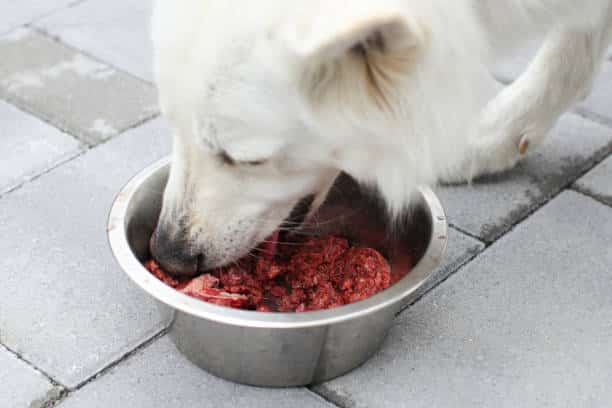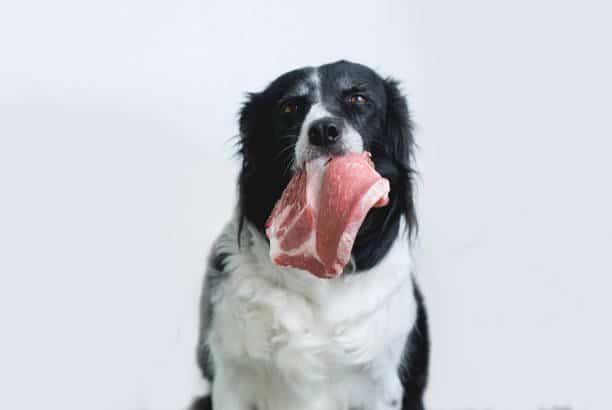Table of Contents
Can dogs eat pork? This is a question that has been asked by both new and long-time pet owners alike. Pork can be an excellent source of nutrition for your dog, but it’s important to understand the risks associated with feeding this type of meat before you make any decisions about adding it to their diet.
In this article we will explore the nutritional value of pork for dogs, as well as its potential benefits and risks so that you can make an informed decision when considering if your pup should enjoy some delicious bacon!
Table of Contents:
- Nutritional Value of Pork for Dogs
- Benefits of Feeding Pork to Dogs
- Risks of Feeding Pork to Dogs
- Conclusion
Nutritional Value of Pork for Dogs
Pork is an excellent source of protein for dogs. It contains all the essential amino acids that a dog needs to stay healthy and strong. The amount of protein in pork varies depending on the cut, but it generally ranges from 15-20% by weight.
This makes it an ideal choice for active or growing dogs who need extra energy and muscle building nutrients.
Fat Content: Pork also contains fat, which can provide your dog with additional energy and help keep their coat shiny and healthy. The amount of fat in pork depends on the cut, but typically ranges from 8-15%. It’s important to note that some cuts may be higher in fat than others, so always check labels before feeding your pup any type of pork product.
Pork is also rich in vitamins and minerals such as iron, zinc, selenium, thiamin (vitamin B1), riboflavin (vitamin B2), niacin (vitamin B3) and vitamin B6. These nutrients are essential for proper growth and development as well as overall health maintenance.
Additionally, they can help boost immunity against disease-causing organisms like bacteria or viruses while providing other benefits such as improved digestion or increased energy levels when consumed regularly by your pet companion(s).

Benefits of Feeding Pork to Dogs
Feeding pork to dogs can offer a number of potential benefits, including improved digestion, increased energy levels, and improved muscle development.
Improved Digestion: Pork is an excellent source of protein for dogs and contains essential amino acids that help support their digestive health. It also contains probiotics which aid in the breakdown of food particles and promote healthy gut bacteria.
This helps keep your dog’s digestive system functioning properly so they can absorb more nutrients from their food.
Increased Energy Levels: Pork is high in B vitamins which are known to increase energy levels in both humans and animals alike. The fatty acids found in pork are also beneficial as they provide a slow release of energy throughout the day rather than a quick burst like other proteins may provide.
This helps keep your pup energized throughout the day without having to rely on sugary snacks or treats for an extra boost.
The high protein content found in pork makes it an ideal choice for helping build lean muscle mass when combined with regular exercise routines such as running or playing fetch with your pup. Amino acids found within pork help repair muscles after strenuous activity while providing additional fuel for growth during recovery periods between workouts.
Additionally, the omega-3 fatty acids present within this type of meat help reduce inflammation associated with soreness after physical activity so your pooch can stay active longer without feeling discomfort or pain afterwards.
Risks of Feeding Pork to Dogs
Contamination risk from parasites and bacteria is one of the primary concerns when feeding pork to dogs. Pork may contain harmful parasites such as trichinella spiralis or salmonella, which can cause serious health issues if ingested by your pet. It is important to ensure that any pork you feed your dog has been cooked thoroughly and stored properly in order to reduce the risk of contamination.
High fat content can also lead to weight gain and other health issues for your pet if they consume too much pork on a regular basis. Pork contains more fat than many other types of meat, so it should only be fed occasionally as part of a balanced diet.
Additionally, some breeds may have difficulty digesting high-fat foods like pork, so it’s important to monitor their food intake carefully if you decide to include this type of meat in their diet.
Finally, potential allergic reactions are another concern when feeding pork to dogs. Some pets may develop an allergy or intolerance after consuming certain proteins found in pork products, resulting in skin irritation or digestive upset.
If you notice any signs of an allergic reaction after introducing new foods into your pet’s diet, discontinue use immediately and consult with a veterinarian for further advice on how best to manage the situation going forward.
Conclusion
In conclusion, it is important to understand the nutritional value of pork for dogs, as well as the potential benefits and risks associated with feeding pork to your pet. While there are some health benefits that can be gained from feeding pork to your dog in moderation, it is important to weigh these against the potential risks before making a decision about whether or not you should feed your dog pork.
Ultimately, when asking “can dogs eat pork?” the answer depends on each individual pet’s needs and preferences.
Do you have a pup that loves to eat anything it can get its paws on? Do you ever worry about what foods are safe for your furry friend to consume? If so, then look no further than our website! Our website provides information and solutions regarding the topic of “Can Dogs Eat Pork”.
We provide helpful tips and advice for owners looking to keep their dogs healthy while still allowing them the occasional treat. Visit us today and find out more about Dog Nutrition and how we can help make sure your dog is eating only the best food choices available!
